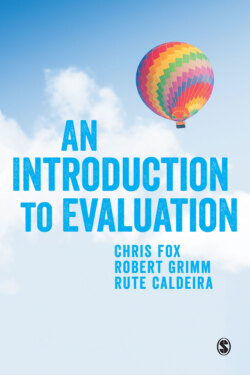Читать книгу An Introduction to Evaluation - Chris Fox - Страница 59
На сайте Литреса книга снята с продажи.
Randomised control trials
ОглавлениеRandomised control trials as a methodological approach have their origins in clinical research. The use of this approach in social programmes gained traction in the early 2000s and garnered fierce proponents and ferocious critics. The balkanised debate went public via some specialised journals (e.g. Journal of Multidisciplinary Evaluation) and some umbrella evaluation associations felt the need to publicly express their position on this (Barahona 2010; Barrett and Carter 2010; Oakley et al. 2008).
In September 2007, the European Evaluation Society (EES) published a statement advocating for the use of diverse methodological approaches to evaluation, noting that the ‘EES however deplores one perspective currently being strongly advocated: that the best or only rigorous or scientific way of doing so is through randomised controls trials (RCTs)’ (European Evaluation Society 2007: 1).
Nevertheless, largely absent from this debate were some important ethical considerations associated with the use of the approach in non-clinical settings, some of which may pose considerable challenges.
Barahona (2010) contrasts informed consent in clinical research trials with informed consent in the context of impact evaluations on social development programmes:
When RCTs are used in clinical research, during the process of recruiting subjects these subjects are informed about a range of factors, such as the trial objectives, the treatments, the risks, the random nature of treatment allocation, the support available to participants, the mechanisms for opting out, and the procedures for providing comments and submitting complaints. This process concludes with each subject agreeing to be included in the trial. When RCTs are proposed for impact evaluation, the issue of consent from participants is not discussed. (Barahona 2010: 16)
And even when the issue of informed consent is discussed, Barrett and Carter (2010) argue that it is so often ‘at the ethically-questionable cost of sacrificing the well-accepted right of each individual participant to informed consent, as well as the corresponding obligation of the researcher to secure such consent’ (Barrett and Carter 2010: 520); this at least is the case for cluster-randomised trials. Indeed evidence of individual informed consent being requested by impact evaluations that use communities as control groups is scarce.
Additionally, Barrett and Carter (2010) and also Scriven (2010) raise the relevant issue of the (double) blindness un-blindness of the RCTs’ subjects/researchers. Commonly in clinical trials neither participants nor researchers assigned to the groups are aware of who is being administered the placebo or the drug. This is in part to avoid participants’ emotional distress. In social programmes’ contexts, participants will be aware of the fact that they are not having the access to intervention that the other participants are.
Finally, there is the very real possibility of violating the ethical guiding principle of ‘do no harm’. Barrett and Carter (2010) provide some examples of impact evaluations in the context of which control groups were incentivised to engage in actions that were dangerous to themselves and others.
As discussed in Chapter 12, the counter argument made by supporters of experiments is that until we know that an intervention is effective it should not be given to people, and a randomised field experiment, because of its high internal validity, is the best evaluation design for showing that an intervention is effective. In support of this counter argument Chalmers highlights what he sees as the double standard whereby many rigorous ethical processes are in place to regulate when and how RCTs are conducted, and yet practitioners routinely use untested interventions without having to meet the same ethical standards:
Professionals who are uncertain about whether a particular intervention (a policy or practice) will do more good than harm, and so wish to offer it only within the context of a controlled trial so that they protect people in the face of current uncertainty and learn about its effects, are expected to observe elaborate informed consent rituals. If exactly the same intervention is offered by other professionals because it was recommended during their professional training three decades previously, or because there is a plausible theory that suggests it will be helpful, or because it is an accepted routine, or because they or the institutions for which they work have a vested financial or political interest in promulgating it ... the standard of consent is relaxed. (Chalmers 2003: 31)
